University Solicitors: LAW101 - Legal Advice on Judy Symons' Case
VerifiedAdded on 2022/10/12
|11
|2234
|163
Report
AI Summary
This report provides legal advice concerning the case of Judy Symons, a nurse facing multiple accusations. The analysis explores potential violations of the Code of Professional Conduct, including practicing while intoxicated, stealing drugs, and falsely claiming to be a doctor. It examines the implications of these actions under Australian law, including potential consequences from the Nursing and Midwifery Board of Australia and the Australian Civil and Administrative Tribunal. The report delves into specific laws regarding intoxication in the workplace, informed consent, criminal impersonation, and theft, emphasizing the importance of professional ethics and conduct. It concludes with recommendations for Judy Symons to address her misconduct and adhere to professional standards.
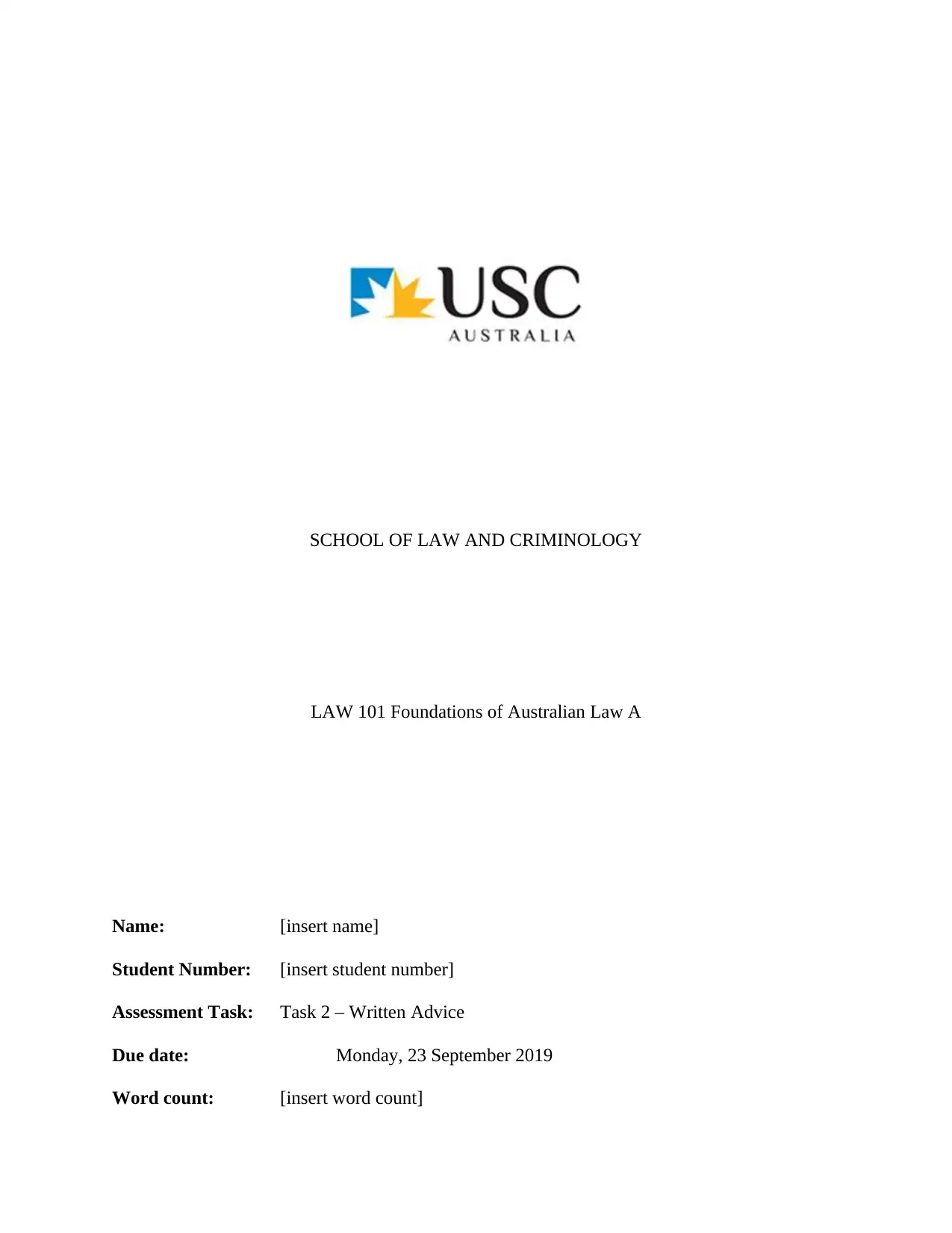
SCHOOL OF LAW AND CRIMINOLOGY
LAW 101 Foundations of Australian Law A
Name: [insert name]
Student Number: [insert student number]
Assessment Task: Task 2 – Written Advice
Due date: Monday, 23 September 2019
Word count: [insert word count]
LAW 101 Foundations of Australian Law A
Name: [insert name]
Student Number: [insert student number]
Assessment Task: Task 2 – Written Advice
Due date: Monday, 23 September 2019
Word count: [insert word count]
Paraphrase This Document
Need a fresh take? Get an instant paraphrase of this document with our AI Paraphraser

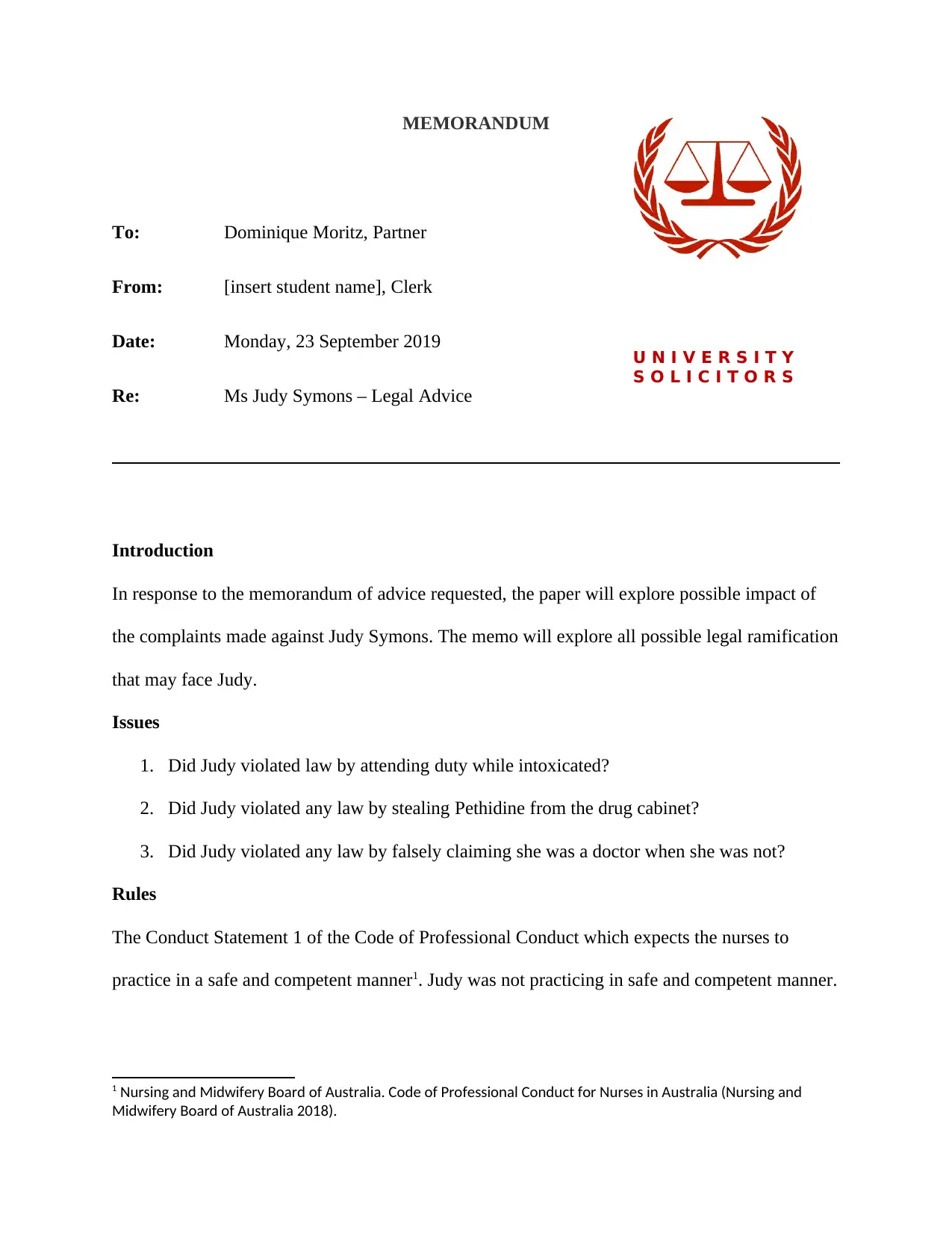
MEMORANDUM
To: Dominique Moritz, Partner
From: [insert student name], Clerk
Date: Monday, 23 September 2019
Re: Ms Judy Symons – Legal Advice
Introduction
In response to the memorandum of advice requested, the paper will explore possible impact of
the complaints made against Judy Symons. The memo will explore all possible legal ramification
that may face Judy.
Issues
1. Did Judy violated law by attending duty while intoxicated?
2. Did Judy violated any law by stealing Pethidine from the drug cabinet?
3. Did Judy violated any law by falsely claiming she was a doctor when she was not?
Rules
The Conduct Statement 1 of the Code of Professional Conduct which expects the nurses to
practice in a safe and competent manner1. Judy was not practicing in safe and competent manner.
1 Nursing and Midwifery Board of Australia. Code of Professional Conduct for Nurses in Australia (Nursing and
Midwifery Board of Australia 2018).
U N I V E R S I T Y
S O L I C I T O R S
To: Dominique Moritz, Partner
From: [insert student name], Clerk
Date: Monday, 23 September 2019
Re: Ms Judy Symons – Legal Advice
Introduction
In response to the memorandum of advice requested, the paper will explore possible impact of
the complaints made against Judy Symons. The memo will explore all possible legal ramification
that may face Judy.
Issues
1. Did Judy violated law by attending duty while intoxicated?
2. Did Judy violated any law by stealing Pethidine from the drug cabinet?
3. Did Judy violated any law by falsely claiming she was a doctor when she was not?
Rules
The Conduct Statement 1 of the Code of Professional Conduct which expects the nurses to
practice in a safe and competent manner1. Judy was not practicing in safe and competent manner.
1 Nursing and Midwifery Board of Australia. Code of Professional Conduct for Nurses in Australia (Nursing and
Midwifery Board of Australia 2018).
U N I V E R S I T Y
S O L I C I T O R S
⊘ This is a preview!⊘
Do you want full access?
Subscribe today to unlock all pages.

Trusted by 1+ million students worldwide
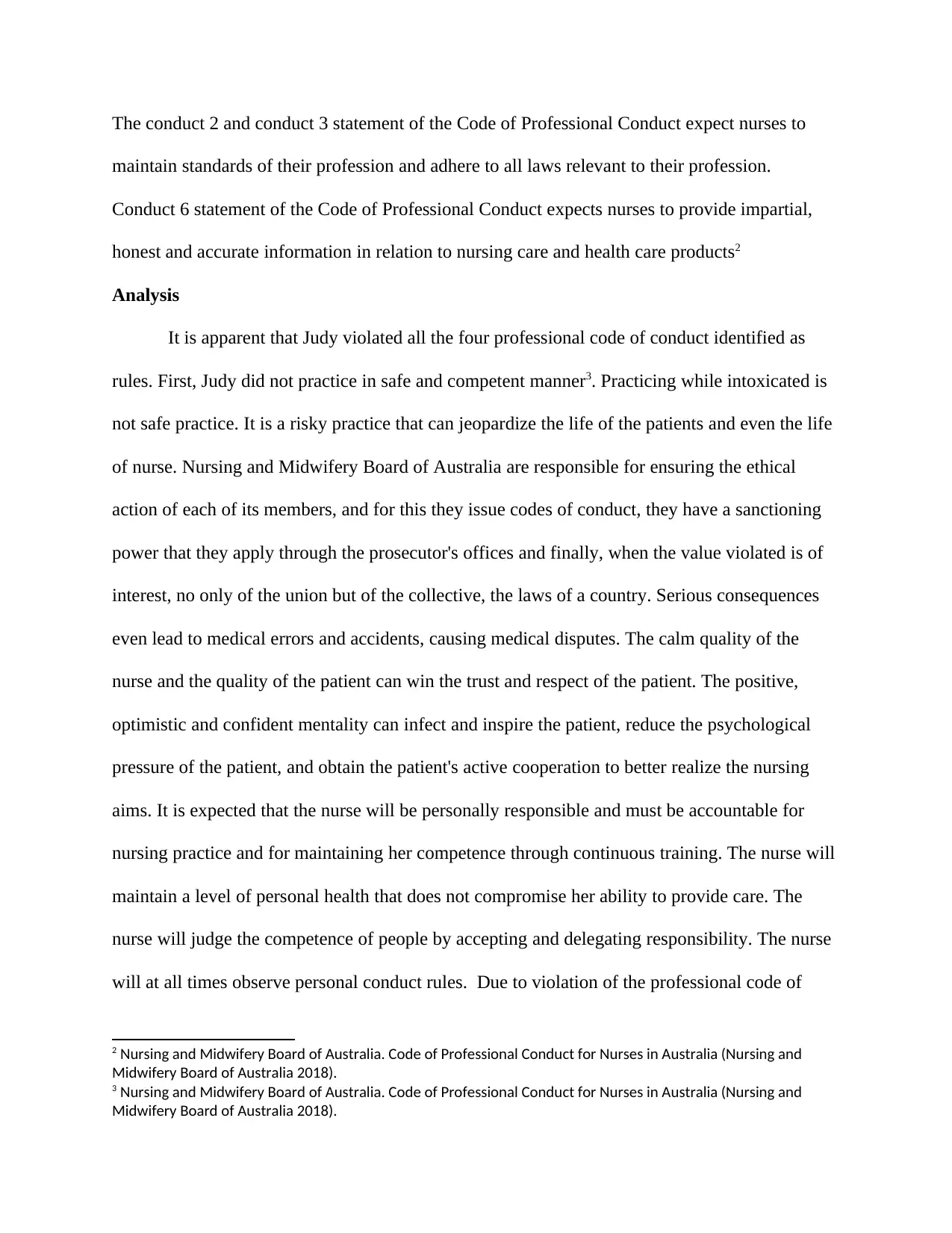
The conduct 2 and conduct 3 statement of the Code of Professional Conduct expect nurses to
maintain standards of their profession and adhere to all laws relevant to their profession.
Conduct 6 statement of the Code of Professional Conduct expects nurses to provide impartial,
honest and accurate information in relation to nursing care and health care products2
Analysis
It is apparent that Judy violated all the four professional code of conduct identified as
rules. First, Judy did not practice in safe and competent manner3. Practicing while intoxicated is
not safe practice. It is a risky practice that can jeopardize the life of the patients and even the life
of nurse. Nursing and Midwifery Board of Australia are responsible for ensuring the ethical
action of each of its members, and for this they issue codes of conduct, they have a sanctioning
power that they apply through the prosecutor's offices and finally, when the value violated is of
interest, no only of the union but of the collective, the laws of a country. Serious consequences
even lead to medical errors and accidents, causing medical disputes. The calm quality of the
nurse and the quality of the patient can win the trust and respect of the patient. The positive,
optimistic and confident mentality can infect and inspire the patient, reduce the psychological
pressure of the patient, and obtain the patient's active cooperation to better realize the nursing
aims. It is expected that the nurse will be personally responsible and must be accountable for
nursing practice and for maintaining her competence through continuous training. The nurse will
maintain a level of personal health that does not compromise her ability to provide care. The
nurse will judge the competence of people by accepting and delegating responsibility. The nurse
will at all times observe personal conduct rules. Due to violation of the professional code of
2 Nursing and Midwifery Board of Australia. Code of Professional Conduct for Nurses in Australia (Nursing and
Midwifery Board of Australia 2018).
3 Nursing and Midwifery Board of Australia. Code of Professional Conduct for Nurses in Australia (Nursing and
Midwifery Board of Australia 2018).
maintain standards of their profession and adhere to all laws relevant to their profession.
Conduct 6 statement of the Code of Professional Conduct expects nurses to provide impartial,
honest and accurate information in relation to nursing care and health care products2
Analysis
It is apparent that Judy violated all the four professional code of conduct identified as
rules. First, Judy did not practice in safe and competent manner3. Practicing while intoxicated is
not safe practice. It is a risky practice that can jeopardize the life of the patients and even the life
of nurse. Nursing and Midwifery Board of Australia are responsible for ensuring the ethical
action of each of its members, and for this they issue codes of conduct, they have a sanctioning
power that they apply through the prosecutor's offices and finally, when the value violated is of
interest, no only of the union but of the collective, the laws of a country. Serious consequences
even lead to medical errors and accidents, causing medical disputes. The calm quality of the
nurse and the quality of the patient can win the trust and respect of the patient. The positive,
optimistic and confident mentality can infect and inspire the patient, reduce the psychological
pressure of the patient, and obtain the patient's active cooperation to better realize the nursing
aims. It is expected that the nurse will be personally responsible and must be accountable for
nursing practice and for maintaining her competence through continuous training. The nurse will
maintain a level of personal health that does not compromise her ability to provide care. The
nurse will judge the competence of people by accepting and delegating responsibility. The nurse
will at all times observe personal conduct rules. Due to violation of the professional code of
2 Nursing and Midwifery Board of Australia. Code of Professional Conduct for Nurses in Australia (Nursing and
Midwifery Board of Australia 2018).
3 Nursing and Midwifery Board of Australia. Code of Professional Conduct for Nurses in Australia (Nursing and
Midwifery Board of Australia 2018).
Paraphrase This Document
Need a fresh take? Get an instant paraphrase of this document with our AI Paraphraser
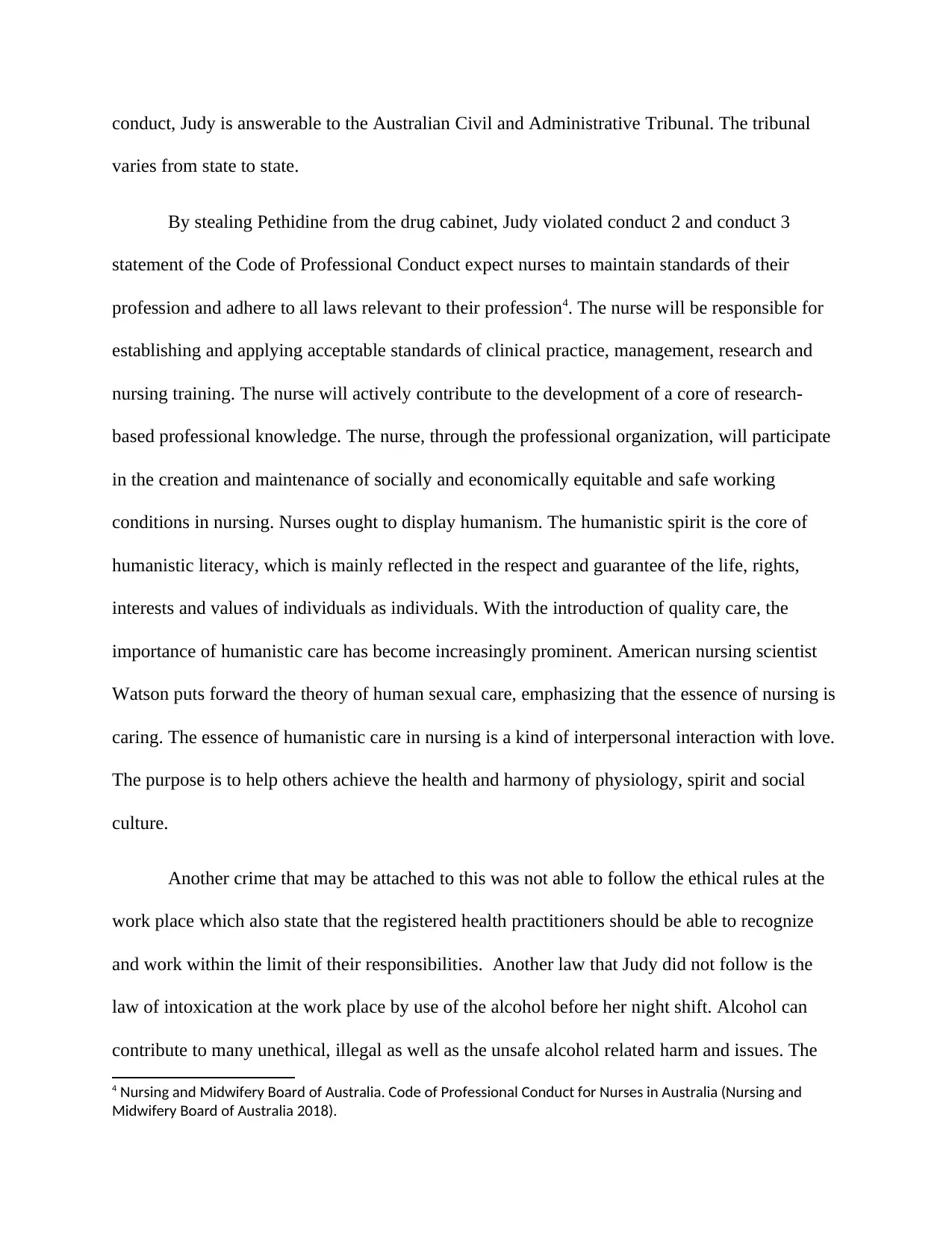
conduct, Judy is answerable to the Australian Civil and Administrative Tribunal. The tribunal
varies from state to state.
By stealing Pethidine from the drug cabinet, Judy violated conduct 2 and conduct 3
statement of the Code of Professional Conduct expect nurses to maintain standards of their
profession and adhere to all laws relevant to their profession4. The nurse will be responsible for
establishing and applying acceptable standards of clinical practice, management, research and
nursing training. The nurse will actively contribute to the development of a core of research-
based professional knowledge. The nurse, through the professional organization, will participate
in the creation and maintenance of socially and economically equitable and safe working
conditions in nursing. Nurses ought to display humanism. The humanistic spirit is the core of
humanistic literacy, which is mainly reflected in the respect and guarantee of the life, rights,
interests and values of individuals as individuals. With the introduction of quality care, the
importance of humanistic care has become increasingly prominent. American nursing scientist
Watson puts forward the theory of human sexual care, emphasizing that the essence of nursing is
caring. The essence of humanistic care in nursing is a kind of interpersonal interaction with love.
The purpose is to help others achieve the health and harmony of physiology, spirit and social
culture.
Another crime that may be attached to this was not able to follow the ethical rules at the
work place which also state that the registered health practitioners should be able to recognize
and work within the limit of their responsibilities. Another law that Judy did not follow is the
law of intoxication at the work place by use of the alcohol before her night shift. Alcohol can
contribute to many unethical, illegal as well as the unsafe alcohol related harm and issues. The
4 Nursing and Midwifery Board of Australia. Code of Professional Conduct for Nurses in Australia (Nursing and
Midwifery Board of Australia 2018).
varies from state to state.
By stealing Pethidine from the drug cabinet, Judy violated conduct 2 and conduct 3
statement of the Code of Professional Conduct expect nurses to maintain standards of their
profession and adhere to all laws relevant to their profession4. The nurse will be responsible for
establishing and applying acceptable standards of clinical practice, management, research and
nursing training. The nurse will actively contribute to the development of a core of research-
based professional knowledge. The nurse, through the professional organization, will participate
in the creation and maintenance of socially and economically equitable and safe working
conditions in nursing. Nurses ought to display humanism. The humanistic spirit is the core of
humanistic literacy, which is mainly reflected in the respect and guarantee of the life, rights,
interests and values of individuals as individuals. With the introduction of quality care, the
importance of humanistic care has become increasingly prominent. American nursing scientist
Watson puts forward the theory of human sexual care, emphasizing that the essence of nursing is
caring. The essence of humanistic care in nursing is a kind of interpersonal interaction with love.
The purpose is to help others achieve the health and harmony of physiology, spirit and social
culture.
Another crime that may be attached to this was not able to follow the ethical rules at the
work place which also state that the registered health practitioners should be able to recognize
and work within the limit of their responsibilities. Another law that Judy did not follow is the
law of intoxication at the work place by use of the alcohol before her night shift. Alcohol can
contribute to many unethical, illegal as well as the unsafe alcohol related harm and issues. The
4 Nursing and Midwifery Board of Australia. Code of Professional Conduct for Nurses in Australia (Nursing and
Midwifery Board of Australia 2018).
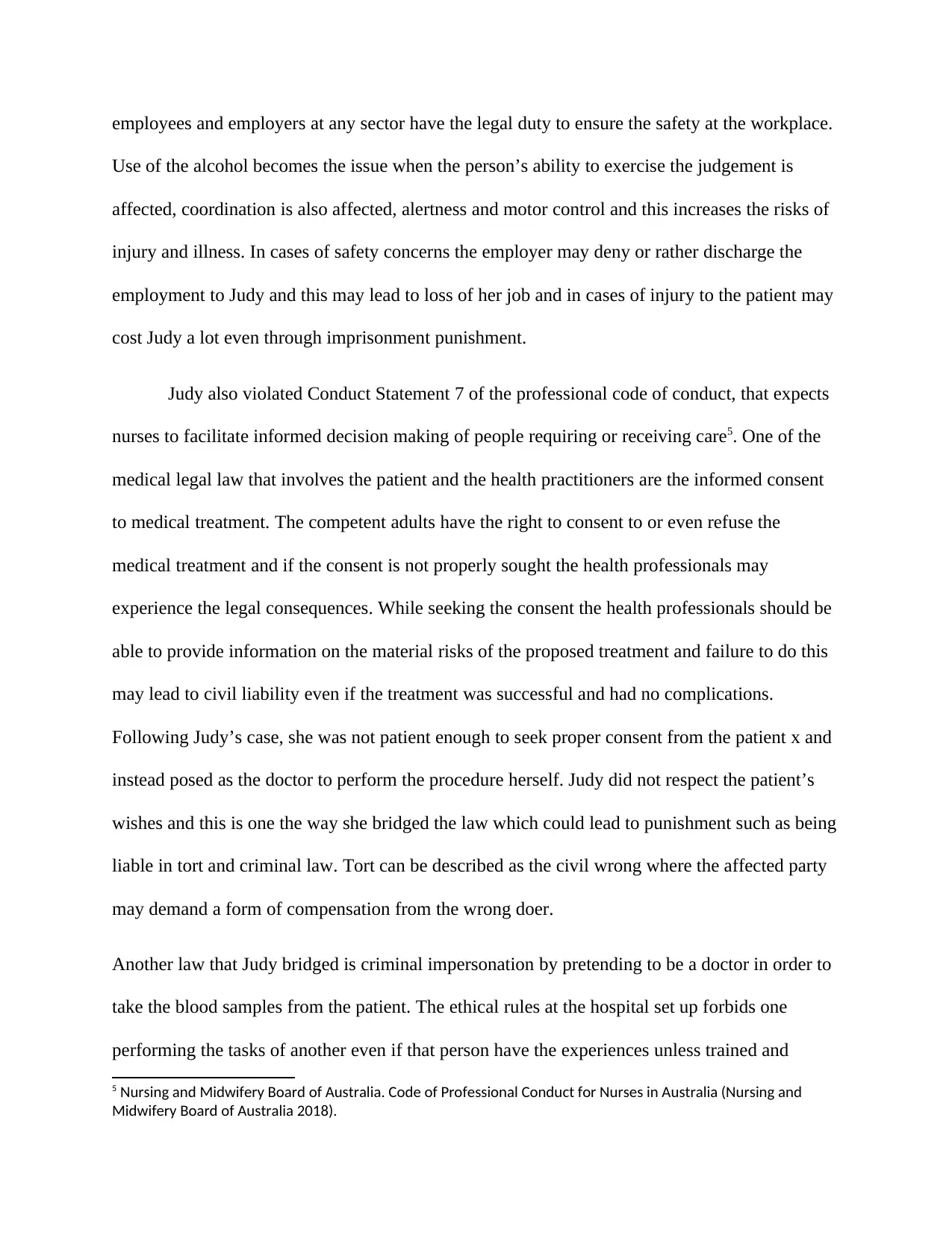
employees and employers at any sector have the legal duty to ensure the safety at the workplace.
Use of the alcohol becomes the issue when the person’s ability to exercise the judgement is
affected, coordination is also affected, alertness and motor control and this increases the risks of
injury and illness. In cases of safety concerns the employer may deny or rather discharge the
employment to Judy and this may lead to loss of her job and in cases of injury to the patient may
cost Judy a lot even through imprisonment punishment.
Judy also violated Conduct Statement 7 of the professional code of conduct, that expects
nurses to facilitate informed decision making of people requiring or receiving care5. One of the
medical legal law that involves the patient and the health practitioners are the informed consent
to medical treatment. The competent adults have the right to consent to or even refuse the
medical treatment and if the consent is not properly sought the health professionals may
experience the legal consequences. While seeking the consent the health professionals should be
able to provide information on the material risks of the proposed treatment and failure to do this
may lead to civil liability even if the treatment was successful and had no complications.
Following Judy’s case, she was not patient enough to seek proper consent from the patient x and
instead posed as the doctor to perform the procedure herself. Judy did not respect the patient’s
wishes and this is one the way she bridged the law which could lead to punishment such as being
liable in tort and criminal law. Tort can be described as the civil wrong where the affected party
may demand a form of compensation from the wrong doer.
Another law that Judy bridged is criminal impersonation by pretending to be a doctor in order to
take the blood samples from the patient. The ethical rules at the hospital set up forbids one
performing the tasks of another even if that person have the experiences unless trained and
5 Nursing and Midwifery Board of Australia. Code of Professional Conduct for Nurses in Australia (Nursing and
Midwifery Board of Australia 2018).
Use of the alcohol becomes the issue when the person’s ability to exercise the judgement is
affected, coordination is also affected, alertness and motor control and this increases the risks of
injury and illness. In cases of safety concerns the employer may deny or rather discharge the
employment to Judy and this may lead to loss of her job and in cases of injury to the patient may
cost Judy a lot even through imprisonment punishment.
Judy also violated Conduct Statement 7 of the professional code of conduct, that expects
nurses to facilitate informed decision making of people requiring or receiving care5. One of the
medical legal law that involves the patient and the health practitioners are the informed consent
to medical treatment. The competent adults have the right to consent to or even refuse the
medical treatment and if the consent is not properly sought the health professionals may
experience the legal consequences. While seeking the consent the health professionals should be
able to provide information on the material risks of the proposed treatment and failure to do this
may lead to civil liability even if the treatment was successful and had no complications.
Following Judy’s case, she was not patient enough to seek proper consent from the patient x and
instead posed as the doctor to perform the procedure herself. Judy did not respect the patient’s
wishes and this is one the way she bridged the law which could lead to punishment such as being
liable in tort and criminal law. Tort can be described as the civil wrong where the affected party
may demand a form of compensation from the wrong doer.
Another law that Judy bridged is criminal impersonation by pretending to be a doctor in order to
take the blood samples from the patient. The ethical rules at the hospital set up forbids one
performing the tasks of another even if that person have the experiences unless trained and
5 Nursing and Midwifery Board of Australia. Code of Professional Conduct for Nurses in Australia (Nursing and
Midwifery Board of Australia 2018).
⊘ This is a preview!⊘
Do you want full access?
Subscribe today to unlock all pages.

Trusted by 1+ million students worldwide
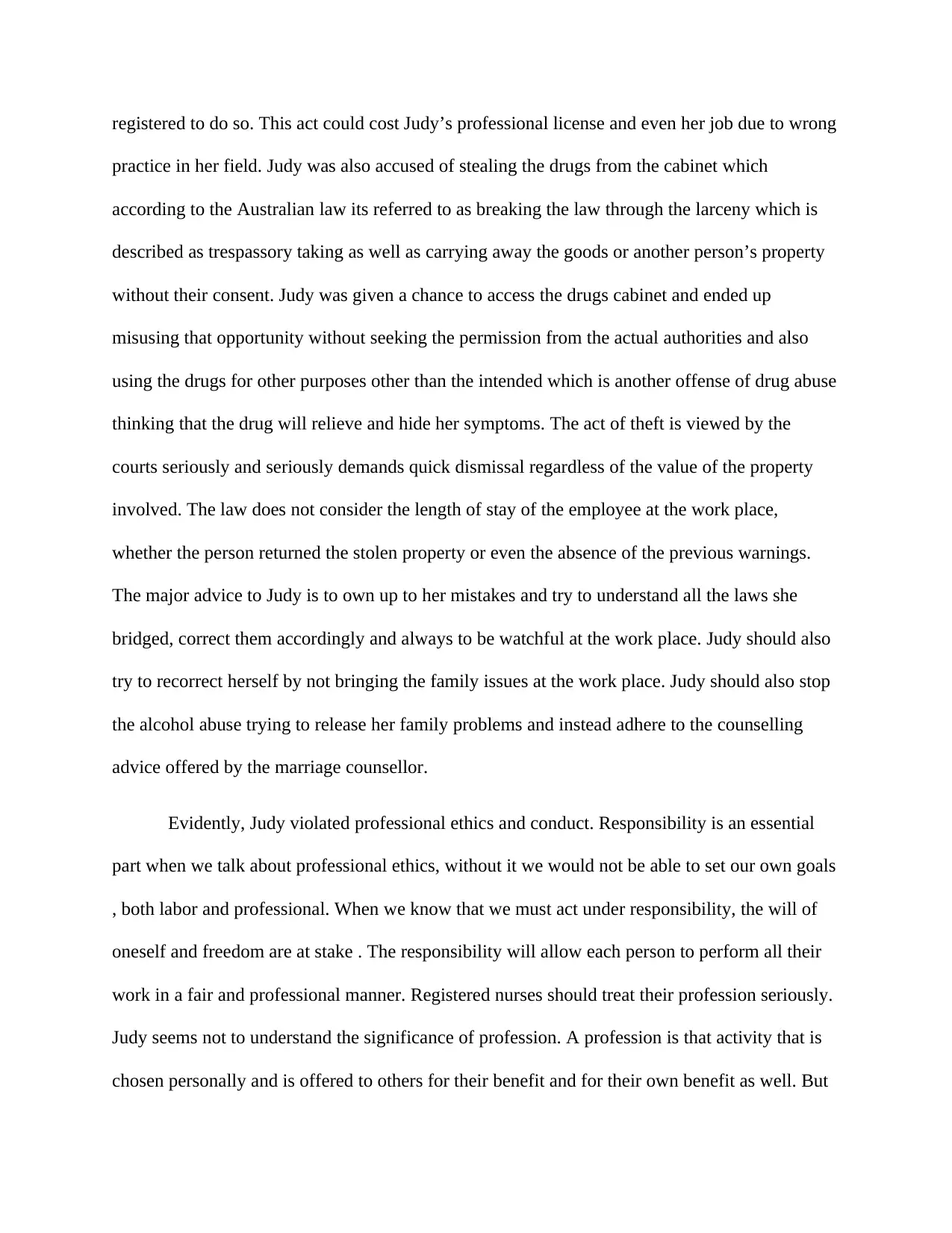
registered to do so. This act could cost Judy’s professional license and even her job due to wrong
practice in her field. Judy was also accused of stealing the drugs from the cabinet which
according to the Australian law its referred to as breaking the law through the larceny which is
described as trespassory taking as well as carrying away the goods or another person’s property
without their consent. Judy was given a chance to access the drugs cabinet and ended up
misusing that opportunity without seeking the permission from the actual authorities and also
using the drugs for other purposes other than the intended which is another offense of drug abuse
thinking that the drug will relieve and hide her symptoms. The act of theft is viewed by the
courts seriously and seriously demands quick dismissal regardless of the value of the property
involved. The law does not consider the length of stay of the employee at the work place,
whether the person returned the stolen property or even the absence of the previous warnings.
The major advice to Judy is to own up to her mistakes and try to understand all the laws she
bridged, correct them accordingly and always to be watchful at the work place. Judy should also
try to recorrect herself by not bringing the family issues at the work place. Judy should also stop
the alcohol abuse trying to release her family problems and instead adhere to the counselling
advice offered by the marriage counsellor.
Evidently, Judy violated professional ethics and conduct. Responsibility is an essential
part when we talk about professional ethics, without it we would not be able to set our own goals
, both labor and professional. When we know that we must act under responsibility, the will of
oneself and freedom are at stake . The responsibility will allow each person to perform all their
work in a fair and professional manner. Registered nurses should treat their profession seriously.
Judy seems not to understand the significance of profession. A profession is that activity that is
chosen personally and is offered to others for their benefit and for their own benefit as well. But
practice in her field. Judy was also accused of stealing the drugs from the cabinet which
according to the Australian law its referred to as breaking the law through the larceny which is
described as trespassory taking as well as carrying away the goods or another person’s property
without their consent. Judy was given a chance to access the drugs cabinet and ended up
misusing that opportunity without seeking the permission from the actual authorities and also
using the drugs for other purposes other than the intended which is another offense of drug abuse
thinking that the drug will relieve and hide her symptoms. The act of theft is viewed by the
courts seriously and seriously demands quick dismissal regardless of the value of the property
involved. The law does not consider the length of stay of the employee at the work place,
whether the person returned the stolen property or even the absence of the previous warnings.
The major advice to Judy is to own up to her mistakes and try to understand all the laws she
bridged, correct them accordingly and always to be watchful at the work place. Judy should also
try to recorrect herself by not bringing the family issues at the work place. Judy should also stop
the alcohol abuse trying to release her family problems and instead adhere to the counselling
advice offered by the marriage counsellor.
Evidently, Judy violated professional ethics and conduct. Responsibility is an essential
part when we talk about professional ethics, without it we would not be able to set our own goals
, both labor and professional. When we know that we must act under responsibility, the will of
oneself and freedom are at stake . The responsibility will allow each person to perform all their
work in a fair and professional manner. Registered nurses should treat their profession seriously.
Judy seems not to understand the significance of profession. A profession is that activity that is
chosen personally and is offered to others for their benefit and for their own benefit as well. But
Paraphrase This Document
Need a fresh take? Get an instant paraphrase of this document with our AI Paraphraser
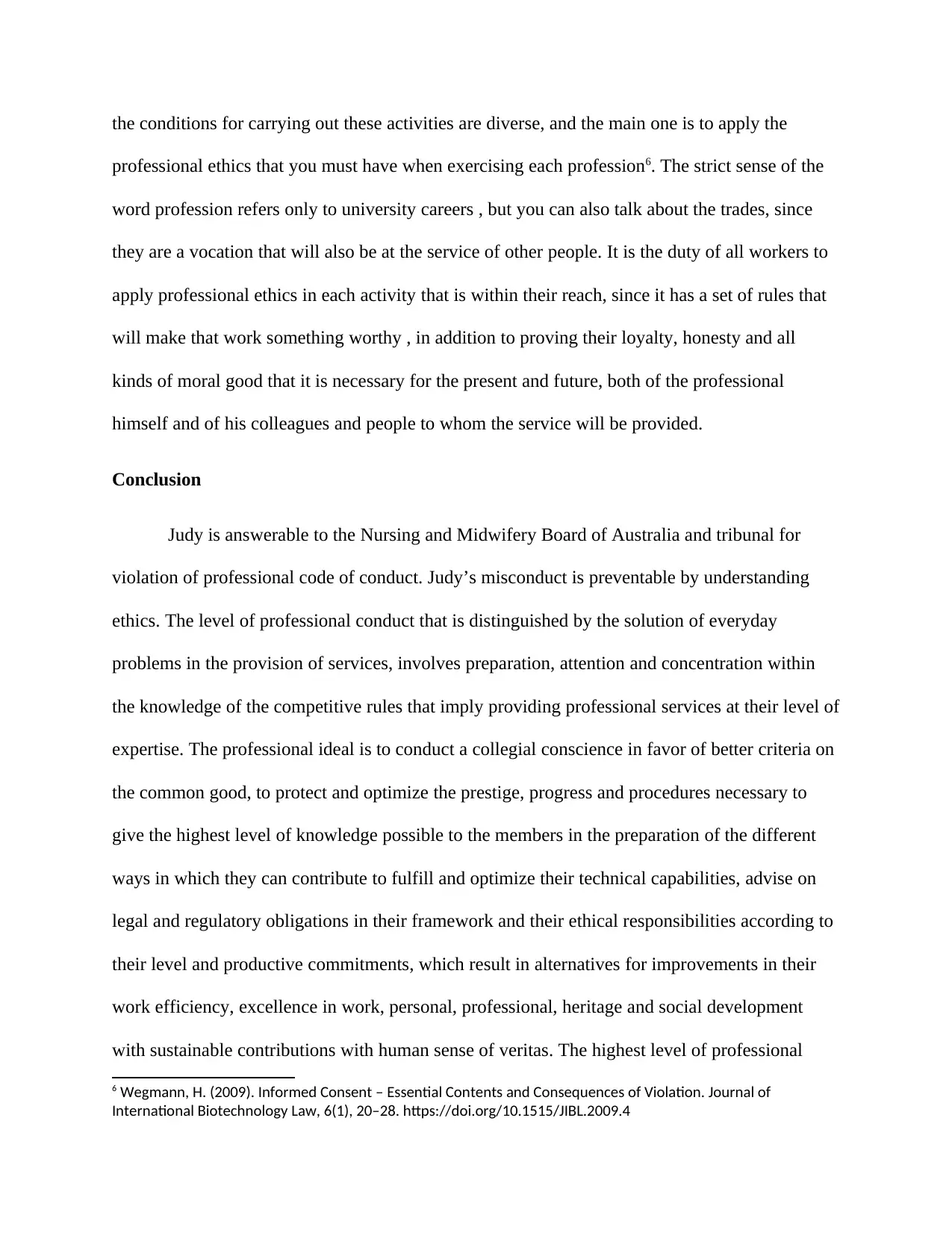
the conditions for carrying out these activities are diverse, and the main one is to apply the
professional ethics that you must have when exercising each profession6. The strict sense of the
word profession refers only to university careers , but you can also talk about the trades, since
they are a vocation that will also be at the service of other people. It is the duty of all workers to
apply professional ethics in each activity that is within their reach, since it has a set of rules that
will make that work something worthy , in addition to proving their loyalty, honesty and all
kinds of moral good that it is necessary for the present and future, both of the professional
himself and of his colleagues and people to whom the service will be provided.
Conclusion
Judy is answerable to the Nursing and Midwifery Board of Australia and tribunal for
violation of professional code of conduct. Judy’s misconduct is preventable by understanding
ethics. The level of professional conduct that is distinguished by the solution of everyday
problems in the provision of services, involves preparation, attention and concentration within
the knowledge of the competitive rules that imply providing professional services at their level of
expertise. The professional ideal is to conduct a collegial conscience in favor of better criteria on
the common good, to protect and optimize the prestige, progress and procedures necessary to
give the highest level of knowledge possible to the members in the preparation of the different
ways in which they can contribute to fulfill and optimize their technical capabilities, advise on
legal and regulatory obligations in their framework and their ethical responsibilities according to
their level and productive commitments, which result in alternatives for improvements in their
work efficiency, excellence in work, personal, professional, heritage and social development
with sustainable contributions with human sense of veritas. The highest level of professional
6 Wegmann, H. (2009). Informed Consent – Essential Contents and Consequences of Violation. Journal of
International Biotechnology Law, 6(1), 20–28. https://doi.org/10.1515/JIBL.2009.4
professional ethics that you must have when exercising each profession6. The strict sense of the
word profession refers only to university careers , but you can also talk about the trades, since
they are a vocation that will also be at the service of other people. It is the duty of all workers to
apply professional ethics in each activity that is within their reach, since it has a set of rules that
will make that work something worthy , in addition to proving their loyalty, honesty and all
kinds of moral good that it is necessary for the present and future, both of the professional
himself and of his colleagues and people to whom the service will be provided.
Conclusion
Judy is answerable to the Nursing and Midwifery Board of Australia and tribunal for
violation of professional code of conduct. Judy’s misconduct is preventable by understanding
ethics. The level of professional conduct that is distinguished by the solution of everyday
problems in the provision of services, involves preparation, attention and concentration within
the knowledge of the competitive rules that imply providing professional services at their level of
expertise. The professional ideal is to conduct a collegial conscience in favor of better criteria on
the common good, to protect and optimize the prestige, progress and procedures necessary to
give the highest level of knowledge possible to the members in the preparation of the different
ways in which they can contribute to fulfill and optimize their technical capabilities, advise on
legal and regulatory obligations in their framework and their ethical responsibilities according to
their level and productive commitments, which result in alternatives for improvements in their
work efficiency, excellence in work, personal, professional, heritage and social development
with sustainable contributions with human sense of veritas. The highest level of professional
6 Wegmann, H. (2009). Informed Consent – Essential Contents and Consequences of Violation. Journal of
International Biotechnology Law, 6(1), 20–28. https://doi.org/10.1515/JIBL.2009.4
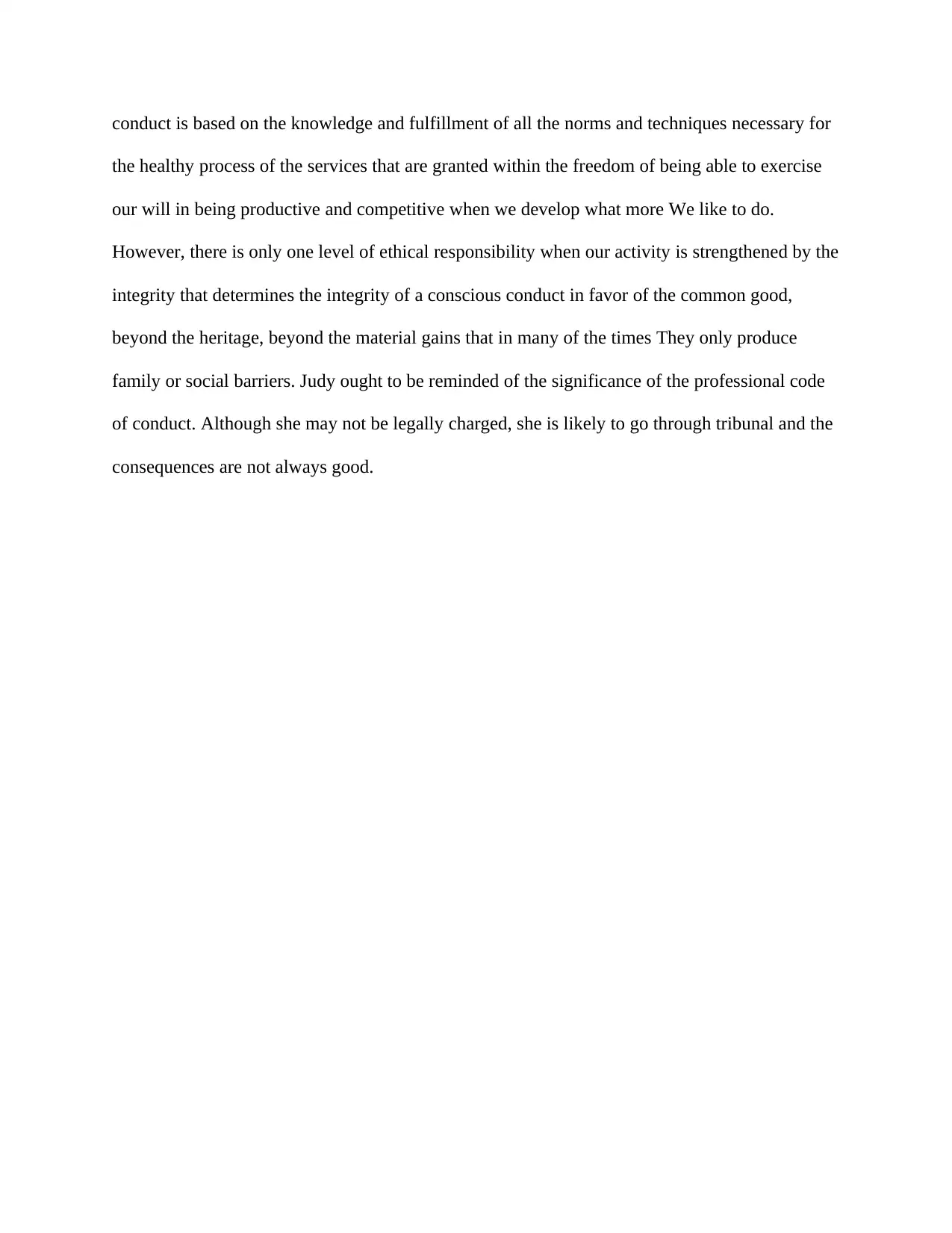
conduct is based on the knowledge and fulfillment of all the norms and techniques necessary for
the healthy process of the services that are granted within the freedom of being able to exercise
our will in being productive and competitive when we develop what more We like to do.
However, there is only one level of ethical responsibility when our activity is strengthened by the
integrity that determines the integrity of a conscious conduct in favor of the common good,
beyond the heritage, beyond the material gains that in many of the times They only produce
family or social barriers. Judy ought to be reminded of the significance of the professional code
of conduct. Although she may not be legally charged, she is likely to go through tribunal and the
consequences are not always good.
the healthy process of the services that are granted within the freedom of being able to exercise
our will in being productive and competitive when we develop what more We like to do.
However, there is only one level of ethical responsibility when our activity is strengthened by the
integrity that determines the integrity of a conscious conduct in favor of the common good,
beyond the heritage, beyond the material gains that in many of the times They only produce
family or social barriers. Judy ought to be reminded of the significance of the professional code
of conduct. Although she may not be legally charged, she is likely to go through tribunal and the
consequences are not always good.
⊘ This is a preview!⊘
Do you want full access?
Subscribe today to unlock all pages.

Trusted by 1+ million students worldwide
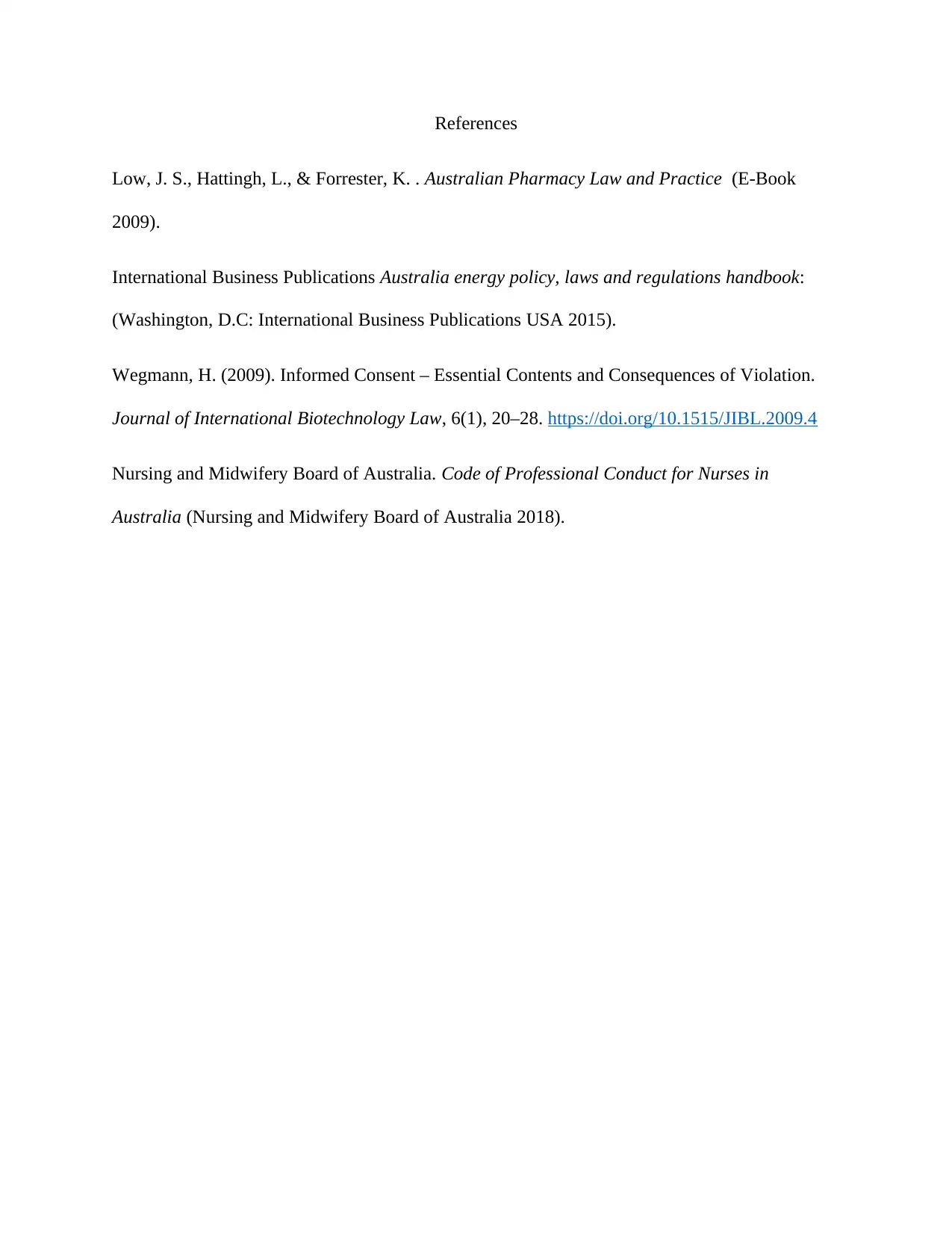
References
Low, J. S., Hattingh, L., & Forrester, K. . Australian Pharmacy Law and Practice (E-Book
2009).
International Business Publications Australia energy policy, laws and regulations handbook:
(Washington, D.C: International Business Publications USA 2015).
Wegmann, H. (2009). Informed Consent – Essential Contents and Consequences of Violation.
Journal of International Biotechnology Law, 6(1), 20–28. https://doi.org/10.1515/JIBL.2009.4
Nursing and Midwifery Board of Australia. Code of Professional Conduct for Nurses in
Australia (Nursing and Midwifery Board of Australia 2018).
Low, J. S., Hattingh, L., & Forrester, K. . Australian Pharmacy Law and Practice (E-Book
2009).
International Business Publications Australia energy policy, laws and regulations handbook:
(Washington, D.C: International Business Publications USA 2015).
Wegmann, H. (2009). Informed Consent – Essential Contents and Consequences of Violation.
Journal of International Biotechnology Law, 6(1), 20–28. https://doi.org/10.1515/JIBL.2009.4
Nursing and Midwifery Board of Australia. Code of Professional Conduct for Nurses in
Australia (Nursing and Midwifery Board of Australia 2018).
Paraphrase This Document
Need a fresh take? Get an instant paraphrase of this document with our AI Paraphraser

1 out of 11
Your All-in-One AI-Powered Toolkit for Academic Success.
+13062052269
info@desklib.com
Available 24*7 on WhatsApp / Email
![[object Object]](/_next/static/media/star-bottom.7253800d.svg)
Unlock your academic potential
Copyright © 2020–2026 A2Z Services. All Rights Reserved. Developed and managed by ZUCOL.
